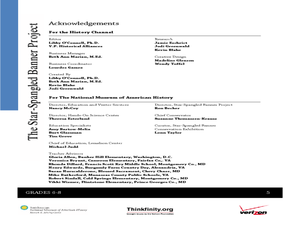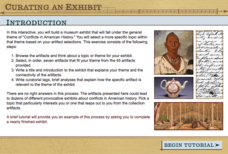Curated OER
Artifacts 2: Artifacts in Context
Students role play as archeologists to determine how artifacts tell about how people lived. In this artifacts lesson, students look at pictures of artifacts of the ancient city of Catalhoyuk and tell what life was like there. They look...
Curated OER
Southeastern Native Americans' Lifestyles
Young scholars complete activities to learn about Southeastern Native Americans. For this lifestyles lesson, students watch a PowerPoint about Southeastern Native Americans, view artifacts from the region and discuss the objects with a...
Curated OER
Reconstructing Artifacts
Students investigate artifacts and reconstruct them. In this artifact lesson, students research archaeologists and Native American groups. Students plan a design for a clay pot which represent the Native American artifact.
Curated OER
Native American Interdisciplinary Educational Unit
Students research various Native American stories and legends. They participate in reader's theater, write original legends, cook Native American foods, construct dioramas and view Native American art and artifacts.
Curated OER
How Has African American Culture Shaped the History of Kentucky?
Eleventh graders explore the African American culture and history of Kentucky. They observe how an author's personal bias can define the argument of his/her publication. Students analyze primary source documents.
Museum of the American Revolution
Historical Analysis: Objects Tell Stories
Dig this! Young archeologists discover what objects teach us about the past. The activity uses an image of a Revolutionary War artifact to help historians practice analyzing the past. Scholars study the object and complete a worksheet to...
Smithsonian Institution
Eastern Indian Wars
Many know that Native Americans were forced off their lands and moved west, but how did these people react? The Red Sticks faction of the Creek nation opted to defend themselves and their lands in a series of wars called the Eastern...
Museum of the American Revolution
People of the Revolution
It's nothing new—America has always been a melting pot of cultures. The resource explores the diversity of individuals living in the American colonies during the Revolutionary War. Scholars examine artifacts and primary sources to...
US House of Representatives
A Picture is Worth a Thousand Words
Groups select a photograph from one of the four eras of African Americans in Congress and develop a five-minute presentation that provides background information about the image as well as its historical significance. The class compares...
Curated OER
Using HyperStudio
Second through eighth graders use the software "HyperStudio" to create a presentation of their choice on Native American lifestyles. One thing I like a lot about this lesson, is that the students are the ones who get to choose and...
Curated OER
Stone Tools of Texas Indians
Provide background information regarding the use of stone tools from the paleoindian through the late prehistoric periods. Learners can read this informational passage to gain insight on how and why we study these amazing artifacts from...
Curated OER
American Indians, European Settlers, and Colonial Arkansas
Students identify the interdependence among various ethnic groups in early Arkansas history. They illustrate timelines and visit historic sites. They make maps of the site and give class presentations.
Smithsonian Institution
General George Washington, Military Leader
Teach pupils the characteristics that make George Washington such an effective leader, especially in context of his time period. Scholars view artifacts, participate in group work, create lists, compare and contrast, and discuss as a...
Curated OER
Ancient Artifacts
Students research the earliest Americans. In this ancient civilizations lesson, students investigate the Mayas, Aztecs, and Incas. Students examine artifacts used in the cultures and then determine what the artifacts were used for and...
Curated OER
Destructive Impact of Environment on Artifacts
Young scholars recognize that artifacts are destroyed over time. In this environmental factors on artifacts lesson, students experiment and observe through the microscope to find the environmental impact on artifacts. Young scholars...
Curated OER
Let Your Motto Be Resistance: African American Portraits: Grades 3-5
Students explore the contributions of African Americans of the 20th century. In this African American history lesson, students examine portraits of Muhammad Ali, Romare Bearden, Lorraine Hansberry, Judith Jamison, and Leontyne Price in...
Channel Islands Film
Lone Woman of San Nicolas Island: Lesson Plan 3
Should researchers be able to excavate, examine, and remove Native American artifacts from historic sites? Should companies be permitted to build on sacred Native American land? After watching West of the West's documentary, The Lone...
Annenberg Foundation
Curating an Exhibit
A curated exhibit at a museum has a point of view. Artifacts are selected and arranged to cause viewers to contemplate this point of view or theme. An interactive provides class members with an opportunity to create an exhibit, to curate...
Channel Islands Film
Cache: Lesson Plan 2 - Grades 4-6
Class members will dig this activity that has them trying their hand at recovering artifacts. Groups are assigned a section of a sandbox, carefully uncover the artifacts in their section, and then develop theories about who might have...
Smithsonian Institution
War of 1812
Luckily for those who aren't history buffs, anyone can guess that the War of 1812 happened in ... 1812. But how to cover the rest of the story? The resource does just that with effective direct instruction that includes statistics,...
American Museum of Natural History
Making a Field Journal
Trowels and brushes are certainly important tools for an archaeologist working on a dig. Perhaps more important, however, is the archaeologist's field journal. Christina Elson, an archaeologist working with the American Museum of Natural...
Smithsonian Institution
World War I
How did World War I effect the United States' status as a world power? Pupils examine a website to learn many interesting facts about American involvement during World War I. They read passages and interact with artifacts in an online...
K12 Reader
What is a Tribal Government?
What is life like on a Native American reservation? Learn about the ways a tribal government works with a reading comprehension activity. After reading a short passage, kids use context clues to answer five comprehension questions.
Curated OER
Introduction to Native Americans Thematic Unit
Students consider different cultural viewpoints. In this Native American history lesson, students examine artifacts and then conduct research on selected Native American tribes.

























